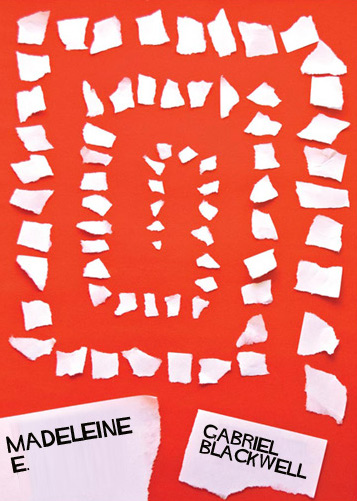
A commonplace book, arranging passages from critics considering Alfred Hitchcock’s Vertigo, along with fragments of memoir and fiction. Presented first as random notes on watching the legendary film, the meticulously arranged fragments soon take up multiple threads and, like a classic Hitchcock movie, present competing realities.
“MADELEINE E. breathes new life into the novel, the monograph, the commonplace book, the memoir. . . This is a book that will be treasured by readers who are eager to glimpse the horizons of contemporary writing as well by those who appreciate a good old-fashioned page-turner. Gabriel Blackwell’s writing proves that a genre-defying literature is not only possible, it’s necessary.”- Evan Lavender-Smith, author of Avatar and From Old Notebooks
“MADELEINE E. is a riveting examination of the self (or selves), spun from the yarn skein in Gabriel Blackwell’s labyrinthine mind. Using Hitchcock’s masterpiece Vertigo as a springboard for cultural and critical investigation and personal narrative, Blackwell has managed to write an impossibly entertaining book — indeed, a philosophical page turner.”- Amber Sparks, author of The Unfinished World and Other Stories
“The first time I saw Lynch’s Mulholland Dr., I watched it again immediately, so mesmerizing was its world. I’ve done this with a few other films, but never with a book—until now. Once I got to the last page of Gabriel Blackwell’s genre-transcending MADELEINE E., I quickly returned to the first. The book is as captivating and addictive as Vertigo, the film Blackwell illuminates and re-imagines. On the level of criticism alone, the book is revelatory: Hitchcock has never appeared so engrossingly strange and alive. But MADELEINE E. is also a profound exploration of identity, doubling, obsession, romantic love, perception, falling, the power of art. Interspersed among the collages of philosophical insight are hypnotic narratives about a man named Gabriel Blackwell, whose many possible lives reveal the dizzying potentials of our own. This is a wondrous book.” – Eric G. Wilson, author of Keep It Fake: Inventing an Authentic Life and Against Happiness: In Praise of Melancholy
“…There is a playfulness about it that parodies the self-seriousness and pretentiousness of the genre. Its pages are peppered with highfalutin names like Wittgenstein, Bakhtin, Baudrillard, and Deleuze, but its tongue is in its cheek. It’s both engaging with the foggy critical discourse that has swirled up around Alfred Hitchcock ever since French intellectuals started taking him much more seriously than the filmmaker ever took himself, and poking fun at it. Madeleine E. is a very fun book, a genuinely mind-bending and dryly hilarious hall of mirrors that combines metafiction with criticism, film theory, and philosophy. Making a work of art about another work of art—in this case, Hitchcock’s Vertigo—is criticism permitted to play. . .” – Benajamin Hale at 3:AM
“…a work of creative criticism of the highest order… The book breathes fresh life into both the task of the novelist and critic… A work of meticulous, creeping dread, Madeleine E flies in the face of the idea that anyone can be who they say they are, that any claim ultimately leads towards a stable truth. Yet it is no polemic, and Madeleine E is far too slippery about its own intentions to be used for anything—which is a comfort in and of itself… In Madeleine E, Gabriel Blackwell aims for the unspeakable. He strikes the mark dead-center.” – Nathan Knapp at Fanzine
“Madeleine E. is organized as a book-length essay, interpolating quotes from other books (some directly about Hitchcock, some not) with observations on Vertigo and scenes from its author’s life. But it’s here that Blackwell pulls an interesting narrative trick and one which evokes the instances of doubling found in Vertigo. . . [T[he ways in which Blackwell uses the techniques of sober nonfiction to encircle a narrative which is quickly becoming a delirious meditation on a film that’s far from lucid is memorable and, at times, ingenious.” – Tobias Carroll at Read It Forward
“. . .What makes Madeleine E. such compelling reading is that very intersection of fact and myth. As the book breaks the film down scene by scene, it compiles anecdotes about the production of Hitchcock’s work with quotes from philosophers and artists from Baudrillard to Gertrude Stein and intermixes them with the author’s daily life. He tries to write, to connect to his continuously distant wife, to stay employed, and his paranoid experiences become increasingly more paranoid—he sees doubles of himself and his wife in various public places, much like in Vertigo itself. The book very quickly takes on a mysterious, drug-like momentum of its own. Like a great mystery film, it makes you want to poke holes in all the storylines around you. It’s a refreshing, haunted take on the essay and the memoir, one that complicates both by refusing to let you say for sure where either ends.” – Blake Butler at VICE
“As someone who has written about Gabriel Blackwell’s work before, I feel oddly unqualified to discuss his latest, and perhaps most accomplished, book, Madeleine E. (Outpost19). Few writers are as ingenious or as incisive on the subject of contemporary America’s relationship to its own industries of the imagination. Madeleine E. demonstrates as much, but it also does considerably more, and by simultaneously widening and narrowing its scope. The very idea of a novel, as both an entertainment and a social enterprise, disappears into the decidedly noir-ish back alleys of a different kind of storytelling in Madeleine E. Philosophy, the natural sciences and film studies are but a few of the discourses expositing and arguing away between the book’s bindings. Zizek only wishes he were as Benjaminian, that he could erect such graceful arcades out of culture’s fracture and babble, as Gabriel Blackwell is here. The result is a work which reminds us that the Singularity happened millennia ago, and that we call it by another name: ‘narrative.” – Joe Milazzo at Entropy in his preface to his Q&A with Gabriel Blackwell
“…The book shares two of its strengths with the movie it’s based on: its tone and its theme of obsessive looking. Despite the book’s multiple voices, Blackwell maintains a melancholy and ruminative mood throughout. More important is his perspicacious eye. Like Scottie’s obsession over “Madeleine,” Blackwell has a keen perception, yet, unlike Scottie, he is aware of his male gaze and obsession. (Those who’ve seen the film at least a few times will get the most out of this book.) In a beautiful passage near the end, Blackwell describes one of the most self-aware ideas at the heart of his observations” “[W}hen we see something seemingly everywhere, it doesn’t mean that the thing we think we are seeing again and again has multiplied somehow or that the world is a code or a conspiracy, but that, in finally taking notice of that thing, we are creating for ourselves a new way of seeing. . .” This doesn’t result in a lean, driven book, but it does present an intelligent, personal meditation on one of the greatest films of all time.”
– Laura Adamczyk at The A.V. Club
“…a bravely experimental work; a piece of creative film criticism written by a non-critic, offered from the perspective of a working writer rather than a reviewer. It’s like looking into a novelist’s notebook, filled with quotations, notes, musings and incomplete sketches, only Blackwell has taken the time to polish each piece, while leaving the whole skillfully fragmented… Blackwell’s greatest service in Madeleine E. is to enlarge Vertigo‘s scope, to increase the number of questions we have about it, rather than to follow the usual critical path and try to shrink it to a single theory that can be easily contained and filed away…”
– G. Smalley at 399 Weird Movies
“A masterfully collaged prose object. . . humorously self-deprecating and marked by a kind of knowing uncertainty even at its most erudite and virtuosic, the narrator’s tone and expansive range also often brings Enrique Vila-Matas and Jean-Philippe Toussaint’s books to mind. The narrator finds that Vertigo, the filmic text he’s sometimes dissecting, sometimes bemoaning how he isn’t dissecting it, is, like the self, not only mutable and multiple but ultimately inexhaustible. . .”
– John Madera at Big Other
Book of the Week at Librairie Drawn & Quartered in Montreal: “A man obsessed with a man obsessed. In Madeleine E., Gabriel Blackwell uses Alfred Hitchcock’s masterpiece Vertigo as a springboard into a complex exploration of identity and memory. Dubbed a commonplace book—a collection of quotations to analyse a subject—Blackwell swirls memoir, fiction, film criticism, and quotes from such figures as W.G. Sebald and Rebecca Solnit, to create a kind of melancholic kaleidoscope (much like Vertigo’s title sequence).”
– via Largehearted Boy
Gabriel Blackwell is the author of The Natural Dissolution of Fleeting-Improvised-Men, Critique of Pure Reason, and Shadow Man. He is co-editor of The Collagist.

